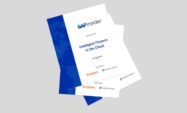SAP Finance Automation
Filter By
Browse By
- SAP Analytics and AI
- SAP Application Development and Integration
- All SAP Application Development and Integration
- SAP ABAP
- SAP ABAP Development Tools
- SAP ABAP Test Cockpit
- SAP API Management
- SAP BAPI
- SAP Basis
- SAP BRF
- SAP Business Application Studio
- SAP CMS
- SAP Design Studio
- SAP Development Tools
- SAP DevOps
- SAP EAI
- SAP EDI
- SAP Extension Suite
- SAP Fiori
- SAP Fiori Elements
- SAP Integration Suite
- SAP Low Code Application Development
- SAP Low Code Automation
- SAP Netweaver
- SAP Release Management
- SAP UI5
- SAP Web Application Server
- SAP Web IDE
- SAP Business Process Management
- SAP Center of Excellence
- SAP CIO
- SAP Customer Experience
- SAP Data and Data Management
- All SAP Data and Data Management
- SAP BW
- SAP BW/4HANA
- SAP Crystal Reports
- SAP Data Archiving
- SAP Data Center
- SAP Data Governance
- SAP Data Integration
- SAP Data Migration
- SAP Data Quality
- SAP Data Services
- SAP Data Strategy
- SAP Data Visualization
- SAP Data Warehouse Cloud
- SAP DMS
- SAP Document Control
- SAP EIM
- SAP ETL
- SAP ETL Tools
- SAP HANA
- SAP HANA Administration
- SAP HANA Deployment Infrastructure
- SAP HANA Studio
- SAP Master Data
- SAP Master Data Governance
- SAP MDM
- SAP Enterprise Architect
- SAP Enterprise Asset Management
- SAP ERP
- SAP Finance
- All SAP Finance
- SAP Accounting
- SAP AR AP
- SAP Asset Accounting
- SAP Billing Systems
- SAP BPC
- SAP BRIM
- SAP Cash Management
- SAP Central Finance
- SAP Controlling
- SAP COPA
- SAP Cost Center Accounting
- SAP Currency Risk
- SAP e-invoicing
- SAP FICO
- SAP Finance Automation
- SAP Advanced Financial Closing
- SAP Financial Consolidation
- SAP Financial Planning
- SAP FX Risk
- SAP General Ledger
- SAP Global Tax Management
- SAP Hyperion
- SAP Order to Cash
- SAP Payment Processing
- SAP Profitability Analysis
- SAP Rebate Management
- SAP S/4HANA Finance
- SAP SWIFT Compliance
- SAP Treasury Management
- SAP Universal Journal
- SAP Governance Risk and Compliance
- SAP Human Capital Management
- SAP Intelligent Technologies
- SAP Platform and Technology
- All SAP Platform and Technology
- SAP Business Technology Platform
- SAP Cloud
- SAP Cloud Connector
- SAP Cloud Integration Platform
- SAP Cloud Migration
- SAP Cloud Platform
- SAP Cloud Providers
- SAP Cloud Strategy
- SAP Digital Signature
- SAP Container Platform
- SAP HANA Enterprise Cloud
- SAP Digital Asset Management
- SAP Smart Forms
- SAP HEC
- SAP Digital Integration Hub
- SAP Hyperscalers
- SAP Infrastructure
- SAP Messaging
- SAP Quality and Testing
- SAP Security
- SAP Spend Management
- SAP Supply Chain Management
- All SAP Supply Chain Management
- SAP APO
- SAP Asset Management
- SAP Business Network
- SAP Digital Manufacturing Cloud
- SAP Digital Twin
- SAP EWM
- SAP IBP
- SAP Inventory Management
- SAP Label Printing
- SAP Logistics
- SAP Manufacturing
- SAP Manufacturing Automation
- SAP MES
- SAP MII
- SAP MM
- SAP MRO
- SAP MRP
- SAP Order Management
- SAP Plant Maintenance
- SAP PLM
- SAP Production Planning
- SAP S&OP
- SAP SD
- SAP SPM
- SAP Supply Chain Planning
- SAP Track and Trace
- SAP Transportation Management
- SAP System Administration
SAP Finance Automation: An Overview and Key Considerations
What Is SAP Finance Automation?
SAP Finance Automation refers to automating manual, repetitive finance processes within the SAP ecosystem of modules, products, and applications that enable SAP ERP customers to address desktop automation or process automation requirements for modernizing inefficient finance and accounting tasks. SAP Finance Automation leverages digital technologies, such as robotic process automation (RPA) and machine learning (ML) to empower SAP modules and applications designed to facilitate the automation of financial processes.
SAP Finance Automation leverages the modern architecture of SAP S/4HANA to support the finance-specific digital transformation. As a result, organizations can streamline and optimize core financial and accounting processes through SAP finance automation best practices. This includes everything from eliminating paper-based tasks to deploying fully integrated and harmonized ERP financial systems.
Key benefits of SAP Finance Automation:
SAP Finance Automation: An Overview and Key Considerations
What Is SAP Finance Automation?
SAP Finance Automation refers to automating manual, repetitive finance processes within the SAP ecosystem of modules, products, and applications that enable SAP ERP customers to address desktop automation or process automation requirements for modernizing inefficient finance and accounting tasks. SAP Finance Automation leverages digital technologies, such as robotic process automation (RPA) and machine learning (ML) to empower SAP modules and applications designed to facilitate the automation of financial processes.
SAP Finance Automation leverages the modern architecture of SAP S/4HANA to support the finance-specific digital transformation. As a result, organizations can streamline and optimize core financial and accounting processes through SAP finance automation best practices. This includes everything from eliminating paper-based tasks to deploying fully integrated and harmonized ERP financial systems.
Key benefits of SAP Finance Automation:
- Finance and accounting managers can view data quicker through automation.
- Automation allows organizations to manage the growing scale of data effectively.
- Ensures tasks are performed to reduce the risk of violating data governance and regulatory compliance standards, which helps organizations avoid costly penalties.
- Allows finance and accounting professionals to work on more strategic tasks.
- Faster, more accurate results increase users’ satisfaction, happiness, and overall experience.
- Organizations can automate their workflows with SAP Finance Automation, freeing them to do more optimization and customization.
Key Considerations for SAPinsiders:
Automation enables digital transformation initiatives to deliver greater efficiency and speed of core finance and accounting processes. Additionally, automation can help reduce the amount of manual work involved in these processes, leading to reduced error rates and improved accuracy. Automation can also play a key role in enabling digital transformation within the finance department. As more businesses move to digital-only models, the need for efficient and effective automation solutions will only continue to grow.
SAP Finance Automation is designed to offer organizations an efficient and cost-effective way to manage their finance and accounting operations. Automated processes are less error-prone and more reliable than manual tasks, improving accuracy and decreasing processing times. Additionally, the use of RPA and ML can help reduce the need for human resources, resulting in significant cost savings. JBS USA provides an example of how organizations can leverage SAP automation tools to save money.
One of the main benefits of SAP Finance Automation is that it can help to improve decision-making. By automating routine tasks and processes, businesses can use the latest analytics and business intelligence (BI) tools to get a better understanding of their financial data. This, in turn, allows them to make more informed strategic decisions about where to allocate their resources and how to grow their business.
81 results
-

- SAP Finance Automation
 Premium
Premium
Enabling Efficient Finance and Accounting Operations via AI with SAP’s Latest Updates
Reading time: 5 mins
SAP's latest AI updates aim to revolutionize finance operations, offering tools for custom app development, agile management, and efficient document processing. These innovations address key challenges faced by finance leaders and are essential for those looking to enhance efficiency and decision-making in their multinational companies. Membership Required You must be a member to access this…
-

Enhancing SAP Finance Automation: Key Takeaways from UiPath Forward VI Conference Session on SAP Solution Accelerators
Reading time: 4 mins
The UiPath Forward VI conference provided an invaluable learning opportunity for companies prioritizing investments in AI driven automation tools. SAPinsider’s Ogo Nwanyanwu attended the conference to learn from their expert speakers. In this article, you will gain deep insights into SAP Solution Accelerators by UiPath. UiPath’s SAP Solution Accelerators are engineered to amplify the ease…
-

Financial Close Transformation Journey: Google and SAP on Google Cloud
Reading time: 3 mins
For years, Google and SAP have worked together to provide efficient solutions for businesses. From 2018 to 2021, Google integrated SAP’s comprehensive data models and end-to-end business processes with Google Cloud technologies, impacting nearly 300,000 direct and indirect employees, as well as numerous other vendors and partners. This project aimed to help key decision-makers shed…
-
-

Finance Transformation for SAP S/4HANA
November 09, 2023
Processes across finance, procurement, and the management of master data can be super complicated. Many of customers know the pain of communication silos, technical debt, bad experiences, and resulting operational costs. ERP systems grew over the years to highly complex landscapes, that involve teams of experts just to keep the lights on – and innovation falls…
-

- SAP Finance Automation
 Premium
Premium
SAP’s AI Copilot Joule: Implications for Finance
Reading time: 4 mins
Joule by SAP represents a transformative step in enhancing AI and human collaboration within the finance sector. With its extensive integration into SAP’s suite of applications and addressing the challenges and needs highlighted by SAPinsider benchmark research, Joule is positioned to significantly impact finance teams using SAP systems. It aims to increase productivity by providing…
-

Trintech Acquires Fiserv’s Reconciliation Solutions and 400 Blue-Chip Clients
Reading time: 3 mins
Trintech recently acquired Frontier Reconciliation and Accurate Reconciliation from Fiserv, a prominent fintech and payments solutions provider. Trintech’s current clientele spans multiple verticals, including financial services, telecommunications, retail, insurance, and utilities, making this strategic move even more impactful for the office of the CFO. This strategic move aligns perfectly with the current trend among SAPinsiders…
-

- SAP Finance Automation
 Premium
Premium
Webinar: CIO’s 2023 Agenda for SAP, SAP S/4HANA, the Cloud, and Beyond
July 18, 2023
2022 brought many challenges in the form of supply chain shortages, scarcity of skills, commodity price fluctuations and geo-political instability. What does 2023 hold in store for Tech Leaders who run SAP? This executive benchmark study delves into the key organizational and technology-focused priorities that CIOs who run SAP are investing in for 2023. See…
-
-

Trintech Expands Adra Suite Financial Close Offering into EMEA Markets
Reading time: 2 mins
Financial close is one of the most important yet difficult process for many SAPinsider organizations. Unfortunately, manual activities, data silos, and disparate systems often cause inefficiencies and make it even harder for enterprises to execute their financial close. Automated financial close solutions allow for reduced closing time by automating or eliminating any long-running steps in…
-

Webinar: Intelligent Finance in the Cloud
June 06, 2023
The convergence of cloud computing, automation, and artificial intelligence (AI) is causing a significant disruption in financial management. With these advanced technologies, finance leaders can upgrade the accuracy and compliance of F&A functions enabling data-driven insights that support better decision-making across the organization. Keeping up with the rapid pace of innovation makes investing in digital…
-

- SAP Finance Automation
 Premium
Premium
CIO’s 2023 Agenda for SAP, SAP S/4HANA, the Cloud, and Beyond
Reading time: 1 mins
2022 brought many challenges in the form of supply chain shortages, scarcity of skills, commodity price fluctuations and geo-political instability. What does 2023 hold in store for Tech Leaders who run SAP? This executive benchmark study delves into the key organizational and technology-focused priorities that CIOs who run SAP are investing in for 2023. See…
Become a Member
Unlimited access to thousands of resources for SAP-specific expertise that can only be found here.
Become a Partner
Access exclusive SAP insights, expert marketing strategies, and high-value services including research reports, webinars, and buyers' guides, all designed to boost your campaign ROI by up to 50% within the SAP ecosystem.
Upcoming Events
Related Vendors
Your request has been successfully sent


